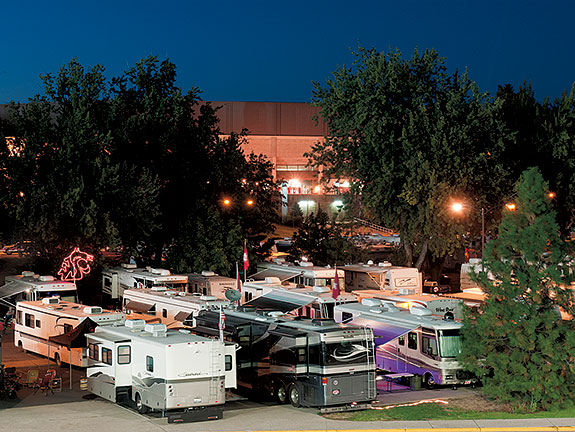On home game weekends during football season, WSU’s Pullman campus goes through a rapid and dramatic transformation. As soon as students and staff vacate their parking lots, a new community, equipped with hibachis and hot dog buns, motors in. These RV-driving Cougar fans come with their families, friends, and sometimes their cats and dogs, too. They set up outdoor living rooms, roam through campus, and share food and fun with the friends and strangers around them.
“It really is its own culture,” says Bridgette Brady, director of transportation services. “What we have here is very important to WSU. And we are unique in how many RVs we accommodate and how comprehensive our program is.”
Brady has a fairly long view of the football parking scene, having started with the campus transportation office as a student twenty years ago. She watched the game scene go from a single parking lot of RVs to a complex community. There were campers then, but they numbered around 100 and mostly filled the Yellow parking lot in front of Beasley Coliseum. Campers would drop $20 in an honor box to pay for a weekend. Some of those folks haven’t changed, says Brady. “We’ve seen that same core of people come back every year.”
But other things did change. Now, demand to park an RV on campus is so high, eight lots fill with more than 400 recreational vehicles, massive land yachts and tiny trailers alike. In recent years, the University has gradually increased the RV rules, to meet both safety concerns and the growing interest in overnight space. Where the RV drivers once parked where they pleased, they’re now assigned defined spots, to offer more organized room and provide fire lanes for emergency vehicles.
Very few schools offer overnight options, says Brady. The UW, for example, opens its parking lots at 6:00 a.m. on game day and closes them just a few hours after the game. Overnight parking is not allowed.
In a recent comparison of Big 10 and Pac-12 schools with lively tailgating scenes, nearly half did not allow overnight parking. Only three, WSU, Stanford, and Texas, offered two nights of parking from Thursday night. That in itself contributes to the sense of a community, of regular neighbors who see each other over entire weekends.
About 10 years ago, things started changing dramatically. RV-ing to games grew more popular, and the parking scene became something of a free-for-all. “We had to make some changes,” says Brady, “particularly for safety.”
The changes now include pre-season communications with the regulars, a command center where people can ask questions or air concerns, improved security, and more bathrooms and dumpsters. Visits from Butch and the spirit squad have helped soften discontent with the changes, particularly with long-term tailgaters who weren’t thrilled that the cost for a season parking pass had risen to $500.
Last year was the big season of change, says Brady. Anticipating even higher demand because of the new athletic director and the new football coach, her office started working closely with the Athletics Department to control and improve the parking environment and, at the same time, keep those elements of RV overnighting that the regulars so loved.
Brady recently wrote about the WSU phenomenon for The Parking Professional, a trade magazine. She focused her story on how transportation services and athletics have teamed up. “We have become an example for other schools,” she says.


